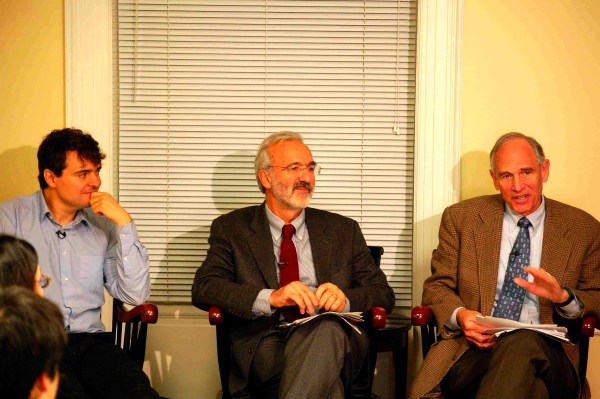Pardee House Seminar: Is The Future Renewable?
VIDEO: Pardee House Seminar
November 17 , 2009

On Tuesday, November 17, 2009, The Frederick S. Pardee Center for the Study of the Longer-Range Future held a seminar on ‘Is The Future Renewable?‘ Part of the ‘Pardee House Seminars’ series, the event featured Prof. Michael Caramanis, Prof. William Moomaw and Dr. Miquel Munoz, and was moderated by Prof. Adil Najam, Director of the Pardee Center. The seminar was organized in collaboration with the Boston University Clean Energy and Environmental Sustainability Initiative (CEESI).
Prof. William Moomaw is Professor of International Environmental Policy and Director of the Center for International Environment and Resource Policy at The Fletcher School at Tufts University. Prof. Moomaw started the discussion by highlighting the recent rapid growth in the usage of renewable energy and the emergence of new technology and innovation in renewable energy. However, he cautioned that without energy efficiency gains, renewable energy will not be a viable source of energy. He also pointed out that by focussing on carbon and emissions so much we have been trying to negotiate the wrong treaty. What we have been trying to get is a ‘pollution’ treaty on climate change, instead what the world really needs is a ‘development’ treaty on climate change. Such a focus would be far more conducive to the transition towards a renewable future. He concluded that the future could be renewable but difficult policy choices would have to be made to make it possible.
Prof. Michael Caramanis is Professor of Engineering at the Department of Mechanical Engineering and Division of Systems Engineering at the Boston University College of Engineering. He adopted a systems perspective to the problem and pointed out that we need to focus not only on innovation in energy generation but also in energy distribution. In particular he stressed the need to focus on information technology and consumer behavior innovations in order to enable synergistic management of energy usage and generation in the home with centralized conventional and renewable generation. He pointed out that transformational changes will have to accompany an affordable and hence sustainable energy future where renewable generation plays the key role. These changes must build on a smarter electricity grid, new electric rate structures and the creation of new markets. These changes will motivate efficiency gains and render the new smart infrastructures resilient to the needed widespread adoption of distributed resources and grid friendly electricity uses such as that of the electric automobile.
Dr Miquel Munoz, who is a postdoctoral fellow at the Frederick S. Pardee Center for the Study of the Longer-Range Future, addressed the different drivers of renewable energy. He pointed out that the three key drivers of a possible energy transition to renewable energy are energy security, industrial policy, and climate change. However, he stressed that while climate is a driver it is not the most important driver of potential change towards renewable energy technologies. Dr. Munoz stressed that there are plenty of very good reasons to pursue a renewable future and we should not make climate change the only, or even the primary, reason to do so.
Following the presentations the audience engaged in a lively discussion with the panelists. Some of the issues discussed included how to collaborate with stakeholders with current vested interests to move renewable energy forward, whether the future is also ‘renewable’ for developing countries and the possibility of technology leapfrogging. The panelists concluded with notes of optimism that the future is renewable given self sufficiency and interaction.